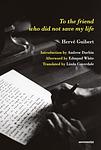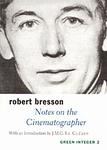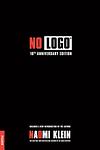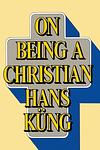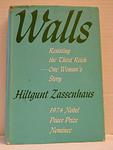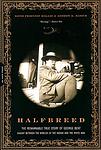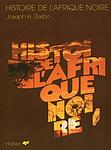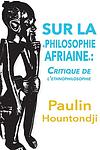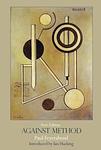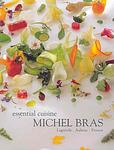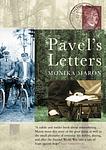The Greatest Canadian, French, German "Nonfiction" Books Since 1970
Click to learn how this list is calculated.
This list represents a comprehensive and trusted collection of the greatest books. Developed through a specialized algorithm, it brings together 300 'best of' book lists to form a definitive guide to the world's most acclaimed books. For those interested in how these books are chosen, additional details can be found on the rankings page.
Genres
Countries
Date Range
Reading Statistics
Click the button below to see how many of these books you've read!
Download
If you're interested in downloading this list as a CSV file for use in a spreadsheet application, you can easily do so by clicking the button below. Please note that to ensure a manageable file size and faster download, the CSV will include details for only the first 500 books.
Download-
1. The Rings of Saturn by W. G. Sebald
"The Rings of Saturn" is a richly detailed travelogue that follows the narrator's journey along the coast of Suffolk, England. The narrative weaves together history, literature, and personal anecdotes, exploring topics as diverse as the decline of the herring industry, the horrors of colonialism in the Congo, and the life of philosopher Sir Thomas Browne. The book is characterized by its melancholic tone, its digressive style, and its meditative reflections on memory, time, and decay.
-
2. Discipline and Punish by Michel Foucault
This book delves into the historical evolution of the penal system, examining how Western societies have transitioned from a regime of violent, public physical punishment to a more subtle form of surveillance and control. It introduces the concept of the "panopticon," a metaphor for modern disciplinary societies that exercise power through observation and normalization rather than through overt physical coercion. The work explores the relationship between power, knowledge, and social control, arguing that disciplinary mechanisms are embedded in various institutions, such as schools, hospitals, and prisons, shaping individuals and maintaining order in society.
-
3. The Emigrants by Winfried Georg Sebald
"The Emigrants" is a novel that explores the experiences and memories of four different emigrants, each with a unique and complex history. The narrative primarily focuses on the psychological impact of displacement and the haunting nature of the past. The author delves deep into their lives, revealing their struggles with identity, loss, and the persistent influence of their roots. The narrative is interwoven with historical events, photographs, and other documents, creating a rich tapestry that blurs the line between fact and fiction.
-
4. To The Friend Who Did Not Save My Life by Hervé Guibert
The book is a candid and harrowing autobiographical novel that chronicles the life of a man grappling with the devastating impact of AIDS during the early years of the epidemic. Through a blend of fact and fiction, the narrative delves into the protagonist's personal experiences with illness, the medical establishment, and the emotional complexities of friendship and mortality. As he confronts his own declining health, the protagonist reflects on the relationships with those around him, including a close friend who is also facing the disease, and the betrayal he feels when a promised miracle cure fails to materialize. The novel is a raw and poignant exploration of the human condition in the face of an unforgiving illness.
-
5. I Will Bear Witness by Victor Klemperer
"I Will Bear Witness" is a chilling personal account of life in Nazi Germany from 1933-1941. The author, a Jewish professor, meticulously details the daily life under Hitler's regime, capturing the fear, oppression, and constant threat that Jews faced. The diary serves as a powerful testament to the horrors of the Holocaust and the resilience of those who endured it.
-
6. Notes On The Cinematographer by Robert Bresson
"Notes on the Cinematographer" is a collection of aphoristic insights and reflections that delve into the art and philosophy of film-making. Compiled from the personal working notebooks of a renowned filmmaker, the book offers a unique exploration of the aesthetic and technical aspects of creating cinema. It emphasizes the importance of purity and restraint in the filmmaker's craft, advocating for a style that eschews theatricality in favor of revealing the hidden truths of characters and scenes through a minimalist approach. The work serves both as a practical guide and a philosophical treatise on the medium, providing readers with a deeper understanding of the author's distinct approach to filmmaking.
-
7. No Logo by Naomi Klein
This book explores the negative effects of corporate branding and globalization. It critiques the marketing strategies of large corporations, arguing that they exploit workers and manipulate consumers. The author also discusses how these corporations have a significant influence on culture and public space. The book suggests that consumer activism and grassroots movements can serve as effective counter-forces to corporate power.
-
8. The Messianic Idea In Judaism, And Other Essays On Jewish Spirituality by Gershom Scholem
This book is a collection of insightful essays exploring the complex nature of Jewish mysticism and the development of the Messianic idea within the Jewish tradition. The author, a preeminent scholar of Jewish mysticism, delves into the historical and spiritual evolution of these concepts, examining their origins, their influence on Jewish thought, and their manifestations throughout Jewish history. The essays also discuss the role of Kabbalah and other mystical traditions in shaping the spiritual landscape of Judaism, offering readers a deep and nuanced understanding of the spiritual dynamics that have animated Jewish life and thought for centuries.
-
9. On Being A Christian by Hans Kueng
The book in question is a comprehensive exploration of Christian faith and its relevance in the modern world. It delves into the historical and philosophical foundations of Christianity, examining its core doctrines, ethical implications, and the challenges it faces in contemporary society. The author critically assesses the role of the Church, the credibility of Christian beliefs in light of scientific progress, and the potential for dialogue with other religions. Throughout, the work emphasizes the importance of a genuine and lived faith, encouraging believers to embody the teachings of Jesus in a way that is both authentic to the Christian tradition and responsive to the needs of today's world.
-
10. Outliers by Malcolm Gladwell
The book examines the factors that contribute to high levels of success. Through a compilation of anecdotes and analyses of various cultural phenomena, it argues that success is not simply a result of individual talent or intelligence, but rather the result of a combination of opportunities, hidden advantages, cultural legacies, and the amount of time spent practicing a specific task. The author challenges the traditional notion of the "self-made" individual by emphasizing the importance of external influences and timing, such as being born in a certain era or having access to specific resources, in shaping one's ability to achieve extraordinary accomplishments.
-
11. Systematic Theology by Wolfhart Pannenberg
"Systematic Theology" is a comprehensive exploration of Christian doctrine from the perspective of a renowned German theologian. It delves into the nature of God, the creation of the universe, and the essence of humanity, among other topics. The author's approach is unique in that he uses historical and scientific knowledge to interpret and explain Christian beliefs, making this a significant contribution to modern theological thought.
-
12. Walls: Resisting The Third Reich by Hiltgunt Zassenhaus
"Walls: Resisting The Third Reich" is a powerful memoir of courage and defiance, recounting the experiences of a young German woman during World War II who risked her life to oppose the Nazi regime. Working as an interpreter in the German courts, she secretly aided Scandinavian prisoners of war, passing along messages and providing them with hope and support. Her clandestine activities, carried out under the constant threat of discovery and execution, showcase the profound bravery and moral conviction required to resist oppression from within the very heart of a totalitarian state. The narrative not only captures the personal struggle against tyranny but also serves as a testament to the human spirit's capacity for resistance and solidarity in the face of overwhelming adversity.
-
13. Halfbreed by Maria Campbell
This autobiographical book is a powerful and candid account of a Métis woman's struggles with identity, poverty, and racism in Canada. It chronicles her journey from a difficult childhood in a small Saskatchewan community, where she faced discrimination and personal tragedies, to her efforts as an adult to find her place in a society that often marginalized Indigenous people. The narrative is a poignant exploration of the author's search for self-acceptance, cultural pride, and her fight against the systemic injustices that Indigenous communities have endured. Her story is a testament to resilience and the strength found in embracing one's heritage.
-
14. L'étrange Destin De Wangrin by Amadou Hampâté Bâ
"L'étrange Destin De Wangrin" by "Amadou Hampâté Bâ" is a captivating narrative that delves into the life of Wangrin, a complex and enigmatic figure in West African society. Through a series of interconnected stories, the book explores Wangrin's rise from a humble clerk to a powerful and influential figure, as well as his eventual downfall. Set against the backdrop of colonialism and cultural clashes, the novel offers a thought-provoking exploration of identity, power dynamics, and the consequences of one's choices.
-
15. Histoire De L'afrique Noire by Joseph Ki-Zerbo
"Histoire De L'afrique Noire" is a comprehensive exploration of the history of Black Africa, written by Joseph Ki-Zerbo. The book delves into the origins of African civilizations, the impact of colonization, and the struggle for independence. Ki-Zerbo analyzes various aspects of African history, including political, economic, and social developments, highlighting the contributions of African leaders and the challenges faced by the continent. This informative and engaging work provides a valuable resource for anyone seeking a deeper understanding of the rich and complex history of Black Africa.
-
16. The Glenn Gould Reader by Glenn Gould
"The Glenn Gould Reader" is a compilation of writings by a renowned Canadian pianist, known for his unique and insightful perspectives on music and culture. This collection offers a window into the artist's mind, featuring a diverse range of essays, articles, reviews, and interviews that explore his philosophies on performance, the intricacies of musical interpretation, and the role of technology in the arts. His articulate and often provocative commentary extends beyond classical music to touch upon a variety of subjects, reflecting his broad intellectual interests and distinctive voice in the world of music and beyond.
-
17. Sur La Philosophie Africaine by Paulin Hountondji
"Sur La Philosophie Africaine" is a thought-provoking exploration of African philosophy by Paulin Hountondji. The book challenges the prevailing notion that African thought is inherently inferior to Western philosophy, advocating for a reevaluation of African intellectual traditions. Hountondji critically examines the impact of colonialism on African philosophy and argues for the development of a truly African philosophical framework that embraces cultural diversity and challenges Eurocentric biases. Through his insightful analysis, Hountondji highlights the richness and complexity of African thought, making a compelling case for its recognition and inclusion in the global philosophical discourse.
-
18. Memoirs by Raymond Aron
The book in question is an intellectual autobiography by a prominent French philosopher and sociologist, chronicling his life from his early years through the tumultuous events of the 20th century. It delves into his experiences during World War II, his observations on the Cold War, and his relationships with other notable intellectuals of his time. The author reflects on his philosophical and political evolution, offering insights into his analytical approach to history, politics, and society. His memoirs serve as a window into the mind of a thinker deeply engaged with the ideological and historical challenges of his era, providing a personal perspective on the broader intellectual currents that shaped the modern world.
-
19. Distinction by Pierre Bourdieu
"Distinction" is a sociological analysis that explores the ways in which the tastes and preferences of individuals are related to their social positions and the structures of power within society. The book argues that aesthetic choices, ranging from music and art to food and drink, are not just indicators of personal preference but are deeply intertwined with social class and the distinctions that classes make to set themselves apart from others. Through a detailed examination of French society, the author demonstrates how cultural consumption patterns are formed and how they function as markers of social status, contributing to the reproduction of social hierarchies and class relations.
-
20. Die Totalitäre Erfahrung by Karl Dietrich Bracher
The book in question provides a comprehensive analysis of totalitarianism, exploring the political and social conditions that give rise to such regimes. It delves into the characteristics of totalitarian states, examining how they gain and maintain power through the manipulation of ideology, the use of terror, and the control of mass communication. The work also reflects on the historical instances of totalitarian governments in the 20th century, offering insights into the dangers they pose to individual freedoms and democratic structures. Through its examination of the dynamics of total control, the book serves as a warning about the fragility of democratic institutions and the constant need to defend them against authoritarian threats.
-
21. Against Method by Paul Feyerabend
"Against Method" argues that science does not adhere to a strict, universal method and that the idea of a singular scientific method is a myth. The author challenges the notion that science progresses through a consistent, rule-based approach, suggesting instead that scientific breakthroughs often require creativity, non-conformity, and the breaking of rules. The book posits that the advancement of knowledge depends on anarchistic strategies that subvert rigid scientific norms, advocating for a more pluralistic, tolerant, and individualistic approach to scientific research. This perspective encourages a methodological pluralism where multiple methodologies coexist, allowing for a more diverse and dynamic scientific inquiry.
-
22. Essential Cuisine by Michel Bras
"Essential Cuisine" is a comprehensive guide to gourmet cooking, written by a renowned French chef. The book provides readers with recipes that highlight the chef's innovative and unique approach to cooking, focusing on the use of fresh, local ingredients. The book also includes stunning photography of the dishes and the chef's home region, making it as much a visual feast as a culinary one. It is a must-have for anyone interested in haute cuisine and the art of fine dining.
-
23. Pavel's Letters by Monika Maron
"Pavel's Letters" is a poignant narrative that explores the personal journey of a novelist who uncovers her family's past in war-torn Poland. After receiving a collection of letters from her grandfather, Pavel, the protagonist delves into the history of her family, their experiences during World War II, and the hardships they faced under Stalin's regime. The book is a compelling blend of personal memories, historical facts, and the exploration of the human spirit's resilience in the face of adversity.
-
24. The Theory Of Communicative Action by Jürgen Habermas
The book is a seminal work in social theory that explores the concept of communicative action, where individuals interact based on mutual understanding and pursue rational arguments, consensus, and cooperation rather than merely acting for individual success. The author critiques the instrumental and strategic action in modern societies and argues that communicative action is essential for maintaining the rationality and democratic nature of human interactions. The work delves into the structures of how language and social interaction form the basis of society and how distortions in communication can lead to social issues, emphasizing the importance of transparent and undistorted communication in achieving genuine understanding and societal cohesion.
-
25. My Father's House by Sylvia Fraser
The book is a harrowing memoir that delves into the author's traumatic childhood, marked by the dark secret of her father's sexual abuse. The narrative unfolds as the author, after years of repressed memories, begins to confront the truth about her past. This journey of self-discovery and healing challenges her understanding of family, memory, and identity. The memoir is a poignant exploration of the long-term effects of abuse and the complex process of recovery, as the author grapples with the betrayal by a person who should have been her protector, ultimately striving to reclaim her sense of self.
Reading Statistics
Click the button below to see how many of these books you've read!
Download
If you're interested in downloading this list as a CSV file for use in a spreadsheet application, you can easily do so by clicking the button below. Please note that to ensure a manageable file size and faster download, the CSV will include details for only the first 500 books.
Download


